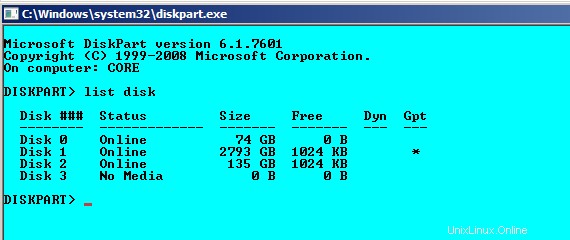C'è diskpart
[start] [run] diskpart list disk

Inoltre, c'è wmic diskdrive . Puoi usarlo dalla riga di comando, ma probabilmente vorrai applicare alcuni filtri per evitare di finire con troppe informazioni.
Availability BytesPerSector Capabilities CapabilityDescriptions Caption CompressionMethod ConfigManagerErrorCode ConfigManagerUserConfig CreationClassName DefaultBlockSize Description DeviceID ErrorCleared ErrorDescription ErrorMethodology FirmwareRevision Index InstallDate InterfaceType LastErrorCode Manufacturer MaxBlockSize MaxMediaSize MediaLoaded MediaType MinBlockSize Model Name NeedsCleaning NumberOfMediaSupported Partitions PNPDeviceID PowerManagementCapabilities PowerManagementSupported SCSIBus SCSILogicalUnit SCSIPort SCSITargetId SectorsPerTrack SerialNumber Signature Size Status StatusInfo SystemCreationClassName SystemName TotalCylinders TotalHeads TotalSectors TotalTracks TracksPerCylinder
512 {3, 4} {"Random Access", "Supports Writing"} LSI 9750-8i DISK SCSI Disk Device 0 FALSE Win32_DiskDrive Disk drive \\.\PHYSICALDRIVE0 5.08 0 SCSI (Standard disk drives) TRUE Fixed hard disk media LSI 9750-8i DISK SCSI Disk Device \\.\PHYSICALDRIVE0 2 SCSI\DISK&VEN_LSI&PROD_9750-8I____DISK\5&15EE98A3&0&000000 0 0 10 0 19 L2080BGN154FA1000272 -576210269 79987195904 OK Win32_ComputerSystem CORE 36707 224 156224992 8222368 224
512 {3, 4} {"Random Access", "Supports Writing"} LSI 9750-8i DISK SCSI Disk Device 0 FALSE Win32_DiskDrive Disk drive \\.\PHYSICALDRIVE1 5.08 1 SCSI (Standard disk drives) TRUE Fixed hard disk media LSI 9750-8i DISK SCSI Disk Device \\.\PHYSICALDRIVE1 2 SCSI\DISK&VEN_LSI&PROD_9750-8I____DISK\5&15EE98A3&0&000100 0 0 10 1 63 WQC05071864F9000A2CB 2999965248000 OK Win32_ComputerSystem CORE 364725 255 5859307125 93004875 255
512 {3, 4} {"Random Access", "Supports Writing"} LSI 9750-8i DISK SCSI Disk Device 0 FALSE Win32_DiskDrive Disk drive \\.\PHYSICALDRIVE2 5.08 2 SCSI (Standard disk drives) TRUE Fixed hard disk media LSI 9750-8i DISK SCSI Disk Device \\.\PHYSICALDRIVE2 1 SCSI\DISK&VEN_LSI&PROD_9750-8I____DISK\5&15EE98A3&0&000200 0 0 10 2 63 P6901YFP93CC9C000C66 -900772765 144987010560 OK Win32_ComputerSystem CORE 17627 255 283177755 4494885 255
Generic Flash HS-COMBO USB Device 0 FALSE Win32_DiskDrive Disk drive \\.\PHYSICALDRIVE3 4.44 3 USB (Standard disk drives) TRUE Generic Flash HS-COMBO USB Device \\.\PHYSICALDRIVE3 0 USBSTOR\DISK&VEN_GENERIC&PROD_FLASH_HS-COMBO&REV_4.44\070809103045&1 0 OK Win32_ComputerSystem CORE
OK, non c'è dubbio che diskpart è uno strumento carino per le partizioni di Windows, ma sembra che possa solo leggere o modificare il disco locale di Windows e le sue partizioni, non è in grado di riconoscere il file del disco come MBR , recovery o EBR1 file di partizione che vedi nel filesystem linux; Quindi esiste davvero uno strumento che corrisponde a fdisk molto nel sistema Windows, è uno strumento cmd, questo è il suo nome e il sito Web di download:
Download fdisk GPT
e questa è la sua immagine di riconoscere il mio MBR file:
Schermata fdisk GPT
Ha una sintassi simile a fdisk -l filename , puoi utilizzare gdisk64.exe -l filename .
La pagina di download include anche il suo sito Web ufficiale, puoi ottenere un maggiore utilizzo da esso! o semplicemente utilizzare il gdisk64.exe /? in cmd per più _